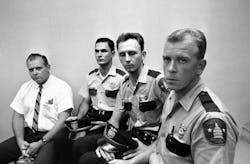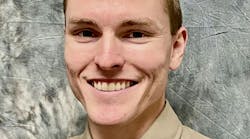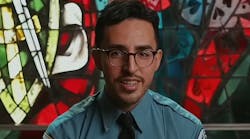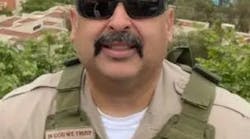Houston McCoy, the Austin police officer who stopped University of Texas Tower sniper Charles Whitman more than 46 years ago, died early Thursday afternoon in a rest home in his hometown of Menard. He was 72.
McCoy died from complications of chronic obstructive pulmonary disease, caused by many years of smoking, said his daughter Monika McCoy.
McCoy would have hated the first sentence of this obituary because it mentions Whitman.
In an interview with the American-Statesman in April 2011, he vehemently requested that Whitman -- whom he didn't call by name but referred to as "the sniper" -- not be included in his final story. "But I guess you have to do that, mention the incident," McCoy said. "Just be sure to say that I was not the only police officer there that day. It was teamwork.
"And, I do not want what I did that day to define me," he said.
But that dark day in Austin history followed McCoy all his life. On Aug. 1, 1966, the 25-year-old Whitman fatally shot 14 people, including Austin police officer Billy Speed, and wounded 32 others until McCoy and fellow officer Ramiro Martinez both fired shots that stopped him. McCoy's blast from a 12-gauge shotgun hit Whitman in the face, and, according to the autopsy, the fatal wounds were to Whitman's head and heart.
A bullet from Martinez's .38-caliber handgun also hit Whitman. Martinez also grabbed McCoy's shotgun and shot Whitman one more time as he lay on the ground.
The frantic moments on the observation deck and who did what and when have been rehashed, researched and analyzed by history buffs and family. It's generally accepted that it was McCoy's shotgun blast that felled Whitman. But Martinez shot him, too, and initially got the credit until about 1970, when then-Police Chief Bob Miles first began to publicly talk about McCoy's role in stopping Whitman. By then, McCoy had resigned from the department and was a civilian flight instructor in Del Rio for the U.S. Air Force.
From his bed in Menard Manor in 2011, McCoy recounted what he remembered: "I got him. But it really doesn't matter whether I got him or Martinez did. Martinez is a good man, and he was the first police officer on the deck to confront the sniper. There were many heroes that day, police officers and civilians."
Funeral services are pending but will be held sometime in early January, family members said. A portion of McCoy's ashes will be put into the San Saba River, near where he was born and raised. The rest will be released with a helium balloon while the poem "High Flight" by John Gillespie Magee Jr. -- a tribute to flying -- will be read.
Wayne Vincent of the Austin Police Association said several current and retired officers will attend.
Austin Police Chief Art Acevedo said in a statement Thursday: "I was privileged to have met and spent time with Houston and his wonderful family the past few years and will miss him dearly. Please take a moment to pray for Houston and his family."
McCoy's children -- Monika, Kristofer, Stefan and Philip McCoy -- remembered a father who raised them in the country without television.
"We have fond childhood memories as a family of reading books, hunting and fishing for our food, canoeing, kayaking, swimming, arrowhead hunting, metal detecting, rattlesnake hunting, exploring, making remote-control airplanes, working on the scout camp, raising animals, having goat barbecues, fish fries and making venison jerky, stuffed sausage and hot tamales," said Monika McCoy. "Pop taught us gun safety at an early age and how to drive anything with wheels as soon as we could see over the steering wheel.
"The loss of our father is enormous," she said. "His intellect and love for teaching his children and grandchildren will be greatly missed."
Monika McCoy has been a driving force in preserving her father's legacy. She gathered copies of everything written about him, including the police file with Whitman's autopsy results. She collected hundreds of family photos from the time that Houston McCoy was a child to his high school days in Menard, when he was all-district in football and basketball and was voted "Best All Around Boy." She arranged reunions with the officers involved in the Tower shooting.
Former Austin police officers who were at the UT Tower shooting remembered McCoy as a man who took his job seriously. He gained their trust.
Jerry Day called McCoy a true Texas hero. "He was an extraordinary man, quiet and a great police officer," Day said. In the mid-1960s when Day was relatively new on the force, he worked the same shift as McCoy. "If you were on a police call with Houston," Day said, "you knew he was there for you."
Friend and former Austin officer Milton Shoquist said that McCoy was a humble man. "All of us who put on a gun and badge every day and go to work, look in the mirror and wonder if we will have what it takes to endure and survive a life or death situation. Houston did not have to ask himself that question after Aug. 1, 1966.
"He has the respect of all whom he worked with. No police officer could ask for anything more," Shoquist said.
Harold Moe, who also responded to the Tower shooting, called McCoy a great friend: "He was the kind of person that would do anything for a friend, just a really good man."
McCoy fell on tough times after he left the Austin Police Department. He was diagnosed with post-traumatic stress syndrome and battled alcoholism.
Shoquist said he was aware of McCoy's troubles: "Like most of us, Houston battled some demons during his life, but I believe, in the end, he won the war.
"It is hard to separate the man from the police officer due to the notoriety surrounding the 1966 tragedy," Shoquist said. "Houston was a modest, unpretentious man. ... His word was his bond and a handshake was as good as a written contract. He was loved by his wife, children, grandchildren and his friends for who he was, not for what happened on the UT Tower that day."
McCoy was asked in an earlier interview how he wished to be remembered. He answered, "That he's just a good old boy."
Copyright 2012 - Austin American-Statesman
McClatchy-Tribune News Service



